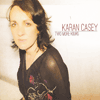
KARAN CASEY - Two More Hours
Crow Valley Music CVCD0004
Karan first made her mark with Irish-American band Solas, with whom she spent four key years before launching out on a solo career, which over the course of five solo albums has garnered her many awards. It’s been a while since 2009’s Ships In The Forest and the widely acclaimed duo album with John Doyle (Exiles Return), the latter appearing shortly before the time of her mother Ann’s death in November 2010. This tragedy naturally engendered a sea change in her outlook and thus also her approach to making a record, and it was the discovery and activity of songwriting that helped Karan to move through the grief and view the world anew from the other side. During this time she immersed herself in poetry reading and “talking to a lot of birds”, deriving much inspiration from the interaction of these experiences with phrases and ideas that were springing into her mind unbidden in a process of true creative catharsis.
The resulting album is a collection of entirely self-penned (or co-written) material that sounds markedly unlike the traditional music for which Karan’s been known hitherto, instead arguably more like a Nanci Griffith record in terms of styling and overall sound. Karan tells her own personal story of loss and longing and self-realisation through decidedly contemporary musical settings that are both accessible and believable in the context of the emotions being expressed, leaving a final impression of a newly-gained sense of inner peace. Although the songs sport strong musical influences that embrace Americana, new-country, soft rock and jazz and pastoral-classical, there’s also something less definable, more subconsciously individual about Karan’s mode of expression that nevertheless brings her invention closer to the musical worlds and overall feel of the likes of Karine Polwart and Crooked Still – from the latter’s ranks, coincidentally, Aoife O’Donovan has emerged to sing with Karan on two of this album’s tracks – while another emigré from the contemporary Americana scene, Abigail Washburn, features on the bluesy Blind Woman.
Standout tracks include the gorgeous lullaby Go To Sleep and Young And Beautiful, where if I shut my eyes I can hear Emmylou Harris; similarly on the intensely moving and heart-stoppingly tender duet Still I Stay (co-written by Karan with Graham Henderson), on which Mick Flannery takes the vocal lead. Closing track The Heron is replete with finely wrought imagery, although I’m not entirely won over by Karan’s decision to employ a spoken delivery for the opening and closing sections. Perhaps in its initial stages the album takes a little while to insinuate itself into one’s consciousness, for the opening (title) song is taken at a deceptively easygoing uptempo recalling a classic 60s-pop craftedness. Home is a setting of a lovely Paula Meehan poem, while Sorrows Away (not the traditional Coppersong) also belies its emotional content to some extent, while also introducing the string arrangement that recurs on a few other tracks, notably the quirky Fishes Will Fly; this scoring is a masterstroke provided by Karan’s husband Niall Vallely, who also produced the record and plays concertina and keyboards on the sessions. Additional instrumental support that lends the album its distinctive mellow character comes courtesy of Kenneth Edge (soprano and alto saxes), Sean-Óg Graham (acoustic guitar), Kate Ellis (cello), Ken Rice (violins, viola), Eoghan Regan (acoustic and electric guitars), Trevor Hutchinson (double bass) and Danny Byrt (drums).
Two More Hours is altogether a very beautiful record and even the stauncher fans of Karan’s traditionally-based work will, I’m sure, discover many delights in this deeply personal set.
www.karancasey.com
David Kidman
| Buy
this CD online from The Listening Post The Listening Post is the CD mailorder service of The Living Tradition magazine. This album was reviewed in Issue 101 of The Living Tradition magazine. |

